

The Wahabites settle in Mali. The mosquitoes in the car do not observe Ramadan and eagerly attack when we drive away from the Malian capital Bamako in the early morning.
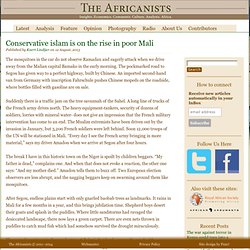
The pockmarked road to Segou has given way to a perfect highway, built by Chinese. An imported second-hand van from Germany with inscription Fahrschule pushes Chinese mopeds on the roadside, where bottles filled with gasoline are on sale. Suddenly there is a traffic jam on the tree savannah of the Sahel. A long line of trucks of the French army drives north. The heavy equipment-tankers, security of dozens of soldiers, lorries with mineral water- does not give an impression that the French military intervention has come to an end. Six steps to fix a broken Mali. It’s too soon to declare Operation Serval a success, and there are already concerns about its eventual end, but the French-led military intervention in Mali has at least brought the country back from the brink of disaster, and opened up a space in which Malians can finally begin to chart a way forward for their nation.
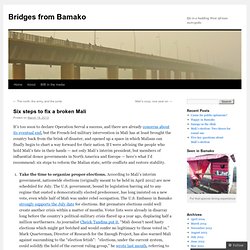
If I were advising the people who hold Mali’s fate in their hands — not only Mali’s interim president, but members of influential donor governments in North America and Europe — here’s what I’d recommend: six steps to reform the Malian state, settle conflicts and restore stability. Take the time to organize proper elections. According to Mali’s interim government, nationwide elections (originally meant to be held in April 2012) are now scheduled for July.
The U.S. government, bound by legislation barring aid to any regime that ousted a democratically elected predecessor, has long insisted on a new vote, even while half of Mali was under rebel occupation. The U.S. Capt. Understanding Mali’s “Tuareg problem” Last week I took part in a “teach-in” organized by Michigan State University devoted to the ongoing crisis in Mali.

A half-dozen Africanist scholars joined a pair of retired U.S. ambassadors to discuss the origins and consequences of that country’s state collapse, ethnic tensions, the rebel takeover and French military intervention. The audience, mostly MSU students and faculty, included several Malians. One recurring subject was the Tuareg people and their place in the Malian nation. Various non-Malian participants spoke of the need to grant the Tuareg some kind of autonomy, while Malians in the room rejected such an arrangement. At one point a Malian graduate student in attendance stated flatly, “There is no ‘Tuareg problem’ in Mali.” Plenty of analyses by Western officials and journalists these days are structured around simple binaries dividing Mali’s population into north and south, white and black, North African and sub-Saharan, good guys and bad guys. Like this: Like Loading... Mali: the fallacy of ungoverned spaces - Home. La drogue au coeur du conflit au Mali.
Le trafic de drogues joue un rôle clé dans la crise au Mali.
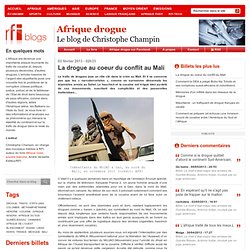
Et il ne concerne pas que les « narcoterroristes », comme on surnomme désormais les islamistes armés au Sahel. Le haschich et la cocaïne ont irrigué bien au-delà de ces mouvements, suscitant des complicités et des passerelles inattendues... Combattants du MUJAO à Gao, au nord du Mali, en novembre 2011 (crédit: AFP) C’était il y a quelques semaines dans un reportage de l’émission Envoyé spécial, sur la chaîne de télévision française France 2. Un jeune homme amputé d’une main par des extrémistes islamistes pour vol à Gao, dans le nord du Mali, décrivait son calvaire. Officiellement, ce sont des islamistes purs et durs, rejetant logiquement les drogues comme « haram » (péché), qui combattent au nord du Mali. Une « vieille » histoire? Le fait que la cocaïne transite par cette zone, en provenance d’Amérique latine, pour rejoindre les rivages de la Méditerranée, ne date pas de la partition du Mali, en avril 2012.
AQMI et la drogue. ANALYSIS: Mali - Options, What Options ??!! ANALYSIS: Just how huge are the challenges facing Mali (First published in January 2013 by Aljazeera English Online) A panorama of Kidal in north eastern Mali.
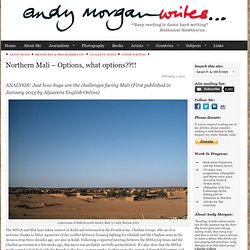
(c) Andy Morgan 2001 The MNLA and MIA have taken control of Kidal and welcomed in the French army. Chadian troops, who are less welcome thanks to bitter memories of the conflict between Touareg fighting for Ghadafi and the Chadian army in the Aouzou strip three decades ago, are also in Kidal. Following a reported meeting between the MNLA top brass and the Chadian government a few weeks ago, this move was probably carefully premeditated. ANALYSIS: What do the Touareg want? ANALYSIS: Secular nationalist?
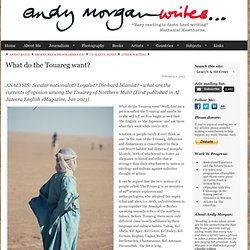
Loyalist? Die-hard Islamist? Interview with ALGHABASS AG INTALLA, leader of the MIA. The heir apparent to the most powerful Touareg tribe in northern Mali speaks...
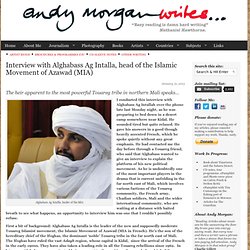
Alghabass Ag Intalla, leader of the MIA I conducted this interview with Alghabass Ag Intallah over the phone late last Monday night, as he was preparing to bed down in a desert camp somewhere near Kidal. He sounded tired but quite relaxed. He gave his answers in a good though heavily accented French, which he spoke quietly without any great emphasis. He had contacted me the day before through a Touareg friend, who said that Alghabass wanted to give an interview to explain the platform of his new political movement. The roots of Al Qaida in the Islamic Maghreb - ANDY MORGAN WRITES.
An extract from my forthcoming book on the story of Tinariwen and the modern Sahara Mokhtar Belmokhtar aka Laouaar aka Monsieur Marlboro aka One Eyed Jack.
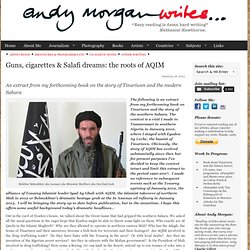
Mali: Nationalists or Islamists? [This oped of mine appeared in the New York Times/Herald Tribune on January 15, 2013] WESTERN powers were taken by surprise by the sudden emergence of an Islamist regime in northern Mali, and are scrambling to understand what has transpired there.

Increasingly, the narrative is one of militant Islam. But the core of the conflict is the nationalist secession movement of the Tuareg people — one that in recent months has been hijacked by Islamist radicals. In the Cold War, the West had a hard time separating out communism from nationalism. That failure led to a string of disastrous interventions, from Cuba to Vietnam. Issikta -Touaregs/Bruxelles - Sahara. Life in a budding West African metropolis. Primer on Jihadi Players in Algeria & Mali « al-Wasat – الوسط. Mali in Focus, Part One: The Jihadist Offensive Revisited. [This article is the first of a three-part series featuring different perspectives on the recent developments in Mali.]
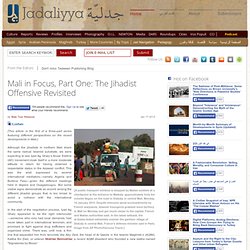
Although the jihadists in northern Mali share the same radical Islamist substrate, we were expecting to see Iyad Ag Ghaly’s Ansar Eddine (AD) movement cloak itself in a more moderate attitude in return for having obtained a respectable status in the Azawad conflict. This was the wish expressed by several international mediators—namely Algeria and Burkina Faso—given the different meetings held in Algiers and Ouagadougou. But some visible signs demonstrate an accord among the different jihadist groups that is too broad to avoid a collision with the international community.
In the start of the negotiation process, Iyad Ag Ghaly appeared to be the right interlocutor—someone who only had local demands, had never taken part in international terrorism, and promised to fight against drug traffickers and organized crime. Summary of Recent Events.